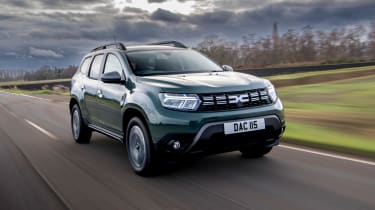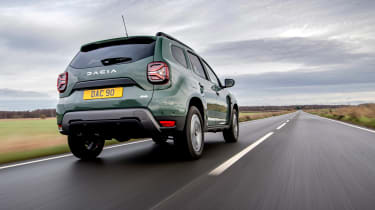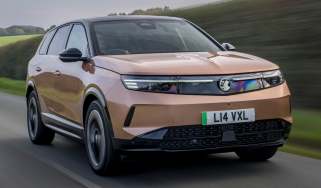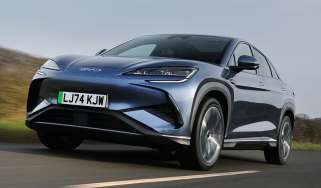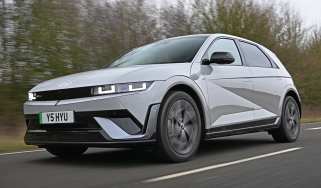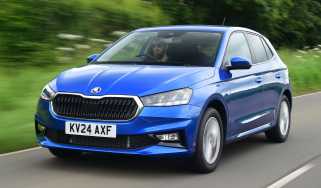Dacia Duster review – a great-value SUV that owners love (2018-2024)
"The great-value Dacia Duster will have you asking why other SUV models are so pricey"
Pros
- Fantastic value
- Top Driver Power rating
- Appealing style
Cons
- Average economy
- Outdated petrol engine
- Three-star safety rating
Verdict – is the Dacia Duster a good car?
The Dacia Duster was one of the best value SUVs on sale, with a starting price of just over £17,000 that was at odds with its chunky styling and practicality. Thanks to its relatively light weight, the Duster is even rather fun to drive and frugal, no matter if you go for one of its petrol or diesel engines. Its interior isn't the last word in luxury, but a facelift in 2021 helped to keep things up to date and the latest Extreme trim gets copper trim accents for a fresh look. With four-wheel drive available as an option for the diesel engine, the Duster can even cope with slippery roads and mild off-roading. These are traits continued by the new Dacia Duster launched in 2024, which gets more chiselled looks and an overhauled interior, but keeps its great value price and we've reviewed it in full.
Dacia Duster models, specs and alternatives
The Dacia Duster first arrived in 2013 as an affordable family SUV that used much of the same underpinnings as the hatchback Dacia Sandero, itself based on much older Renault technology. This time around, the second-generation Dacia Duster is based on more modern underpinnings, like its smaller sibling, so it actually feels more up-to-date than its competitive pricing would have you expect.
More reviews
Its price may have crept up slightly, but the Dacia Duster is similar in size to more expensive SUVs like the Nissan Qashqai, yet still costs less than many small cars and superminis, making it very compelling. Frugal – yet simple – engines mean the Dacia Duster is cheap to run, too. If you live near an LPG pump and want to make use of this cheaper fuel, like the Sandero, the Dacia Duster can even be had as a ‘bi-fuel’ version which can run on this or conventional petrol at the flick of a switch.
SUVs have boomed in popularity in recent years, so the Duster has a long list of rivals, though it’s easily the cheapest of them all – these include SUVs like the Skoda Karoq, SEAT Arona, Renault Captur and Ford Puma. A third-generation Dacia Duster is just around the corner, which is set to become a dose more stylish, continuing its assault on the family SUV segment.
The Duster appeals thanks to its chunky styling and raised driving position, but we’d have to say that the new Dacia Jogger offers even more value for money and its seven-seater capability and practical touches make it even better suited if you have a large family, yet still costs less than a supermini. In both cases, you do have to overlook its lack of high-tech safety features and its correspondingly poor safety result.
With the Duster having become such a well-loved and widely recognised machine, you can't blame Dacia for wanting the latest model to closely resemble the original. Originally introduced in 2018, the current Duster’s shape, proportions and character barely changed from the previous model. Only the finer details and lines were updated to keep the latest model looking fresh.
The latest Duster wears a wider front grille that’s flanked by headlamps with a more 3D look. The window line is slightly raised compared to before, too, for a tougher look, and the impression of strength is further expressed by boldly flared wheel arches front and rear.
A facelift in late 2021 added several minor cosmetic changes to the Duster including a redesigned radiator grille, a range of updated alloy wheel designs and additional paint colours, and a new van-like commercial model. The biggest difference is the adoption of the brand’s ‘Y-Shaped’ light design for the headlights and tail lights, a signature already seen on the latest Dacia Sandero range. The brand also added new fabrics for the interior, along with a new centre console that adds extra storage space. This generation of Duster was completely replaced in 2024 by an all-new model, that we've also tested in full.
There are four different power options for the Duster, including three standard petrols and the aforementioned Bi-Fuel model that uses petrol and LPG. There was previously one diesel offered in top Extreme trim, but this has been discontinued. The 99bhp TCe 100 Bi-Fuel costs the same as the 89bhp entry-level TCe 90 petrol engine, allowing the driver to switch between petrol or LPG fuel, which is typically around half the price. Both of these engines come with a six-speed manual gearbox.
A pair of more powerful petrol models are also available, badged TCe 130 and TCe 150. Both are powered by the same 1.3-litre turbocharged petrol engine, with the 128bhp version getting a six-speed manual gearbox and the range-topping 148bhp variant coming with a six-speed dual-clutch automatic. The 113bhp 1.5-litre Blue dCi 115 diesel engine is no longer available, but could be specified with either two-wheel-drive or four-wheel-drive.
The range now starts from 'Essential' trim which replaced the relatively spartan ‘Access’ trim previously offered, and introduces air-conditioning, cruise control and speed limiter, a DAB-equipped stereo with Bluetooth and USB connectivity and a smartened-up exterior with front fog lights – and all without breaking the bank. We reckon it’s worth springing for Expression trim, though, which adds a rear-view camera, an eight-inch infotainment screen, sat nav, alloy wheels and an on-board computer, so it offers better value for money and enough extra equipment to suit most buyers.
There's loads of space inside for a growing family and the interior is smartly designed, even if the materials aren't all from the top drawer. The Duster is even a fairly enjoyable car to drive – it doesn't have reflexes as sharp as the SEAT Arona or Ford Puma, but it doesn’t weigh much, and it’s stable, grippy and doesn't lean too heavily in corners.
It's disappointing, though, that features like autonomous emergency braking and active cruise control are conspicuously absent. Given the Duster's attractive pricing, we wouldn't expect them to be necessarily standard, but it seems an oversight that they're not available at all. As a result of this, independent crash-test experts Euro NCAP gave the latest Duster an undistinguished three-star safety rating.
The Dacia Duster's came first out of 50 models in our 2024 Driver Power owner satisfaction survey, with strong scores for reliability, running costs, value and infotainment. The Mk2 Duster certainly has a lot to offer – it's a big step forward from the Dacias of old where design and desirability are concerned, with a lack of sophisticated safety equipment being the only real blot on its copybook.


